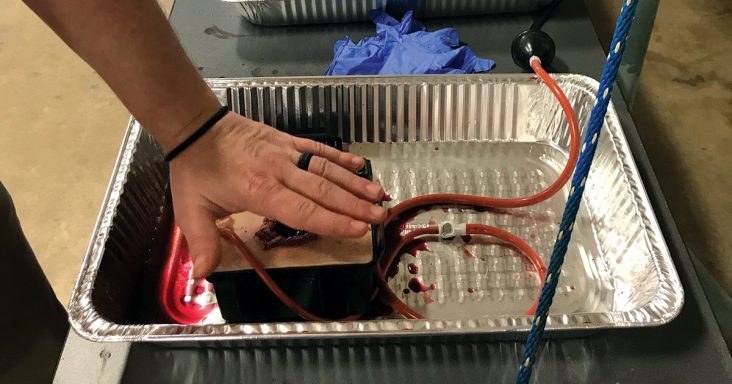Foundations work to bring trauma care to rural Arkansas
by December 5, 2018 7:29 am 566 views

Trauma victims in rural Arkansas often are many miles and many precious minutes away from potentially life-saving care, decreasing their odds for survival until they reach a hospital.
Statistics from the National Trauma Research Program indicate that more than 192,000 Americans die from trauma each year, with 90% of trauma patients dying on-site or in transit to the hospital. Approximately 60% of preventable deaths that occur in the first hour occur due to uncontrolled bleeding, 30% to chest trauma and 10% to airway issues.
Jonesboro-based nonprofit Stop The Bleeding Foundation (STBF), with assistance from the Blue and You Foundation for a Healthier Arkansas, is taking steps to decrease the number of preventable deaths across northern Arkansas.
Law enforcement, firefighters and other first responders arrive first at a trauma scene, noted Toby Emerson, the Craighead County coroner and an experienced paramedic who serves as a SWAT team medic for the Jonesboro Police Department and the Arkansas State Police.
Distances from an ambulance base to a trauma scene, and from the scene to a hospital equipped to handle trauma cases, tend to be significant. Arkansas’ rural road system, the 12th-largest in the nation, exacerbates the problem of distance between a trauma victim and the care the victim needs. In Arkansas, accidents are the fifth-leading cause of death, suicide the 11th cause of death and homicide the 14th-leading cause of death. First responders are likely to be the first to arrive at such scenes.
STBF trains and equips police, fire and first responders to provide life-saving care to trauma victims until they can arrive at a hospital. Lives that otherwise would likely be lost can be saved, according to the group. STBF has been chosen for the second consecutive year to receive a grant of nearly $150,000 from the Blue and You Foundation to provide the training and equipment for emergency personnel.
In the 2018 grant year, STBF used $150,000 from Blue and You to train nearly 800 first responders in the Northeast Arkansas Trauma Zone and equip them with IFAKs (Individual First Aid Kits) containing tourniquets, compressed gauze bandages, chest seals, trauma dressings, shears and gloves. When they complete the eight-hour classroom and hands-on scenario-based training course, graduates are given the IFAKs on the condition they carry them on and off duty.
In 2019, the STBF will train and equip at least 600 emergency personnel in the North Central Arkansas Trauma Zone with a $149,973 grant from the Blue and You Foundation.
The Blue and You Foundation grant funding allowed STBF to acquire a realistic, iPad-controlled mannequin for the training.
“It’s extremely life-like. It weighs 180 pounds just like a real person,” said STBF President Spencer Guinn. “The skin feels real, it can talk, it breathes, it bleeds, and you can even do very advanced surgical procedures on it. This is a game changer.”
Guinn, a Jonesboro orthopedic surgeon, served several tours with the U.S. Army in Iraq as a combat surgeon. He saw first-hand the benefit of bringing the principles of battlefield care for trauma to rural Arkansas. He, Emerson and longtime paramedic and SWAT medicJeremy McIntire, who serves as the project manager, began working to improve trauma victims’ odds of survival by providing this type of training approximately 10 years ago “because it’s something we’re pretty passionate about.”
STBF was formed about three years ago. Though it’s impossible to predict how many lives ultimately might be saved as a result of the training, the organization wants to offer the education statewide. McIntire said in Northeast Arkansas, the foundation has documented 12 “saves” by personnel using training and equipment the foundation provided. Recently, the Exchange Club of Jonesboro named Jonesboro Police Department officer Blaine Middlecoff the Officer of the Year for 2018 for a saving a child whose artery had been severed by a knife during a domestic violence incident.
“If we save just one life with this training it’s all worth it,” Emerson said.
